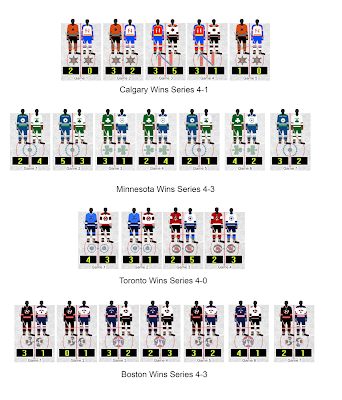Although the 1971 draft was not as strong as past drafts, there were certainly some gems. Denver decided to forgo top prospect Archie Stone to address their desperate need on defense and select defenseman Paul Pittman. Stone ended up going to Vancouver, a club hoping to find a winger to compliment star center Jim Cobb. Pittsburgh selected junior star Nate Carroll, while Hamilton took Gilbert Boudreau. LA selected American winger Ray Fowler to round out the top five. Fowler, a Boston native, became the highest American ever chosen in the draft. The only trade in the draft came at the end of the first round, when Detroit traded their pick to Toronto for Racers veteran center Bobby Kitchen. Toronto then used the pick to select goaltender Ralph Morello.
Denver - Paul Pittman, D
Vancouver - Archie Stone, F
Pittsburgh - Nate Carroll, F
Hamilton - Gilbert Boudreau, F
Los Angeles - Ray Fowler, F
Quebec - Dennis Lambert, F
St. Louis - Toby Griffin, D
Philadelphia - Kurt Hopkins, F
California - Brian Hardy, F
New York - Glen Reed, F
Ottawa - Derrick Rowe, F
Chicago - Gary Johnson, D
Calgary - Pete Powell, F
Boston - Brad Bush, F
Toronto - Alan Knight, F
Minnesota - James Cummings, F
Winnipeg - Kent Collier, D
Montreal - Bobby Roland, D
Nova Scotia - Tim Burgess, F
Toronto (From Detroit) - Ralph Morello, G
Retirements:
Ted McLean, G, Quebec, Winnipeg 1954-1971
PEI native Ted McLean backstopped the Quebec dynasty through the early '60s, winning four Lewis Cups with the Nationale in 1960, '61, '62, and '65. In 1966, McLean was selected in the expansion draft by the Winnipeg Pioneers, where he led them to two consecutive division titles in 1970 and '71.
Tommy Cooper, D, Boston, Montreal, St. Louis 1949-1971
22-year veteran Tommy Cooper never played for Winnipeg, and yet he was one of the most important pioneers in the game's history. In 1949, Cooper became the first black player in PHL history. Cooper made his presence felt immediately, scoring 41 goals in his rookie season with Boston. Cooper would go on to play 22 years between the PHL and Global Hockey League, winning two Lewis Cups in 1959 with Boston and 1966 with Montreal.
David Stairs, F, Toronto, Minnesota, Buffalo 1954-1971
Stairs played a key role in Toronto's two championships in 1958 and '64. He was taken in the expansion draft in 1966 by Minnesota but demanded a trade halfway through the season. He was eventually dealt to Buffalo. When it was announced that the Bulls would be moving to Denver for the 1971-72 season, Stairs decided to retire rather than make the move west.
Jeff Saxton, D, Toronto, 1955-1971
Saxton played 16 seasons, all with Toronto. He won two Lewis Cups with the Racers in 1958 and 1964.
Transactions:
Toronto trades F Bobby Kitchen to Detroit in exchange for Detroit's first round pick.
Detroit gets yet another star forward hungry for another championship while Toronto uses the pick to address their need in net, selecting Ralph Morello.
Winnipeg trades F Cliff Bates to Philadelphia in exchange for G Scott Watson.
Ted McLean's retirement left the Pioneers without a goalie. Scott Watson will fill in for a season or two. In Bates, the Redshirts get a young player not projected to be much more than a depth player.
Philadelphia trades F Adam Turner to Quebec in exchange for G David Zimmer.
Despite the big name involved, this is not a very consequential trade. Zimmer's play deteriorated dramatically in 1970-71. He will likely retire at season's end and wanted to finish his career with the team he played 14 seasons with




































